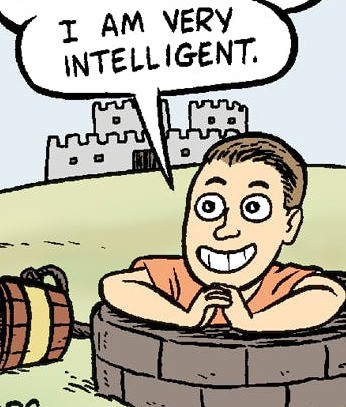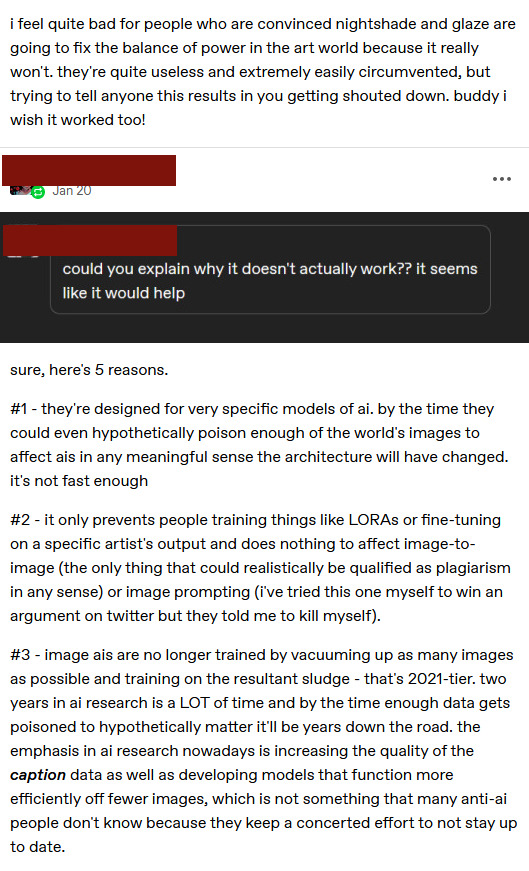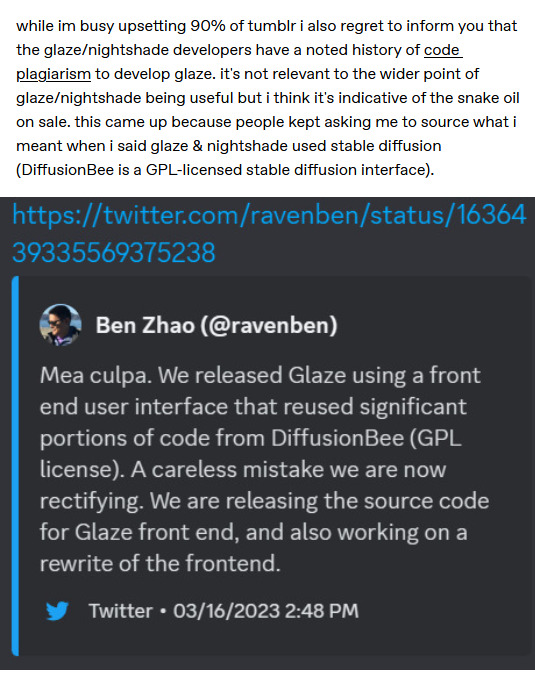#ai snake oil
Text
Twinkfrump Linkdump

I'm touring my new, nationally bestselling novel The Bezzle! Catch me in CHICAGO (Apr 17), Torino (Apr 21) Marin County (Apr 27), Winnipeg (May 2), Calgary (May 3), Vancouver (May 4), and beyond!

Welcome to the seventeenth Pluralistic linkdump, a collection of all the miscellany that didn't make it into the week's newsletter, cunningly wrought together in a single edition that ranges from the first ISP to AI nonsense to labor organizing victories to the obituary of a brilliant scientist you should know a lot more about! Here's the other 16 dumps:
https://pluralistic.net/tag/linkdump/
If you're reading this (and you are!), it was delivered to you by an internet service provider. Today, the ISP industry is calcified, controlled by a handful of telcos and cable companies. But the idea of an "ISP" didn't come out of a giant telecommunications firm – it was created, in living memory, by excellent nerds who are still around.
Depending on how you reckon, The Little Garden was either the first or the second ISP in America. It was named after a Palo Alto Chinese restaurant frequented by its founders. To get a sense of that founding, read these excellent recollections by Tom Jennings, whose contributions include the seminal zine Homocore, the seminal networking protocol Fidonet, and the seminal third-party PC ROM, whence came Dell, Gateway, Compaq, and every other "PC clone" company.
The first installment describes how an informal co-op to network a few friends turned into a business almost by accident, with thousands of dollars flowing in and out of Jennings' bank account:
https://www.sensitiveresearch.com/Archive/TLG/TLG.html
And it describes how that ISP set a standard for neutrality, boldly declaring that "TLGnet exercises no control whatsoever over the content of the information." They introduced an idea of radical transparency, documenting their router configurations and other technical details and making them available to the public. They hired unskilled punk and queer kids from their communities and trained them to operate the network equipment they'd invented, customized or improvised.
In part two, Jennings talks about the evolution of TLG's radical business-plan: to offer unrestricted service, encouraging their customers to resell that service to people in their communities, having no lock-in, unbundling extra services including installation charges – the whole anti-enshittification enchilada:
https://www.sensitiveresearch.com/Archive/TLG/
I love Jennings and his work. I even gave him a little cameo in Picks and Shovels, the third Martin Hench novel, which will be out next winter. He's as lyrical a writer about technology as you could ask for, and he's also a brilliant engineer and thinker.
The Little Garden's founders and early power-users have all fleshed out Jennings' account of the birth of ISPs. Writing on his blog, David "DSHR" Rosenthal rounds up other histories from the likes of EFF co-founder John Gilmore and Tim Pozar:
https://blog.dshr.org/2024/04/the-little-garden.html
Rosenthal describes some of the more exotic shenanigans TLG got up to in order to do end-runs around the Bell system's onerous policies, hacking in the purest sense of the word, for example, by daisy-chaining together modems in regions with free local calling and then making "permanent local calls," with the modems staying online 24/7.
Enshittification came to the ISP business early and hit it hard. The cartel that controls your access to the internet today is a billion light-years away from the principled technologists who invented the industry with an ethos of care, access and fairness. Today's ISPs are bitterly opposed to Net Neutrality, the straightforward proposition that if you request some data, your ISP should send it to you as quickly and reliably as it can.
Instead, ISPs want to offer "slow-lanes" where they will relegate the whole internet, except for those companies that bribe the ISP to be delivered at normal speed. ISPs have a laughably transparent way of describing this: they say that they're allowing services to pay for "fast lanes" with priority access. This is the same as the giant grocery store that charges you extra unless you surrender your privacy with a "loyalty card" – and then says that they're offering a "discount" for loyal customers, rather than charging a premium to customers who don't want to be spied on.
The American business lobby loves this arrangement, and hates Net Neutrality. Having monopolized every sector of our economy, they are extremely fond of "winner take all" dynamics, and that's what a non-neutral ISP delivers: the biggest services with the deepest pockets get the most reliable delivery, which means that smaller services don't just have to be better than the big guys, they also have to be able to outbid them for "priority carriage."
If everything you get from your ISP is slow and janky, except for the dominant services, then the dominant services can skimp on quality and pocket the difference. That's the goal of every monopolist – not just to be too big to fail, but also too big to care.
Under the Trump administration, FCC chair Ajit Pai dismantled the Net Neutrality rule, colluding with American big business to rig the process. They accepted millions of obviously fake anti-Net Neutrality comments (one million identical comments from @pornhub.com addresses, comments from dead people, comments from sitting US Senators who support Net Neutrality) and declared open season on American internet users:
https://ag.ny.gov/press-release/2021/attorney-general-james-issues-report-detailing-millions-fake-comments-revealing
Now, Biden's FCC is set to reinstate Net Neutrality – but with a "compromise" that will make mobile internet (which nearly all of use sometimes, and the poorest of us are reliant on) a swamp of anticompetitive practices:
https://cyberlaw.stanford.edu/blog/2024/04/harmful-5g-fast-lanes-are-coming-fcc-needs-stop-them
Under the proposed rule, mobile carriers will be able to put traffic to and from apps in the slow lane, and then extort bribes from preferred apps for normal speed and delivery. They'll rely on parts of the 5G standard to pull off this trick.
The ISP cartel and the FCC insist that this is fine because web traffic won't be degraded, but of course, every service is hellbent on pushing you into using apps instead of the web. That's because the web is an open platform, which means you can install ad- and privacy-blockers. More than half of web users have installed a blocker, making it the largest boycott in human history:
https://doc.searls.com/2023/11/11/how-is-the-worlds-biggest-boycott-doing/
But reverse-engineering and modding an app is a legal minefield. Just removing the encryption from an app can trigger criminal penalties under Section 1201 of the DMCA, carrying a five-year prison sentence and a $500k fine. An app is just a web-page skinned in enough IP that it's a felony to mod it.
Apps are enshittification's vanguard, and the fact that the FCC has found a way to make them even worse is perversely impressive. They're voting on this on April 25, and they have until April 24 to fix this. They should. They really should:
https://docs.fcc.gov/public/attachments/DOC-401676A1.pdf
In a just world, cheating ripoff ISPs would the top tech policy story. The operational practices of ISPs effect every single one us. We literally can't talk about tech policy without ISPs in the middle. But Net Neutrality is an also-ran in tech policy discourse, while AI – ugh ugh ugh – is the thing none of us can shut up about.
This, despite the fact that the most consequential AI applications sum up to serving as a kind of moral crumple-zone for shitty business practices. The point of AI isn't to replace customer service and other low-paid workers who have taken to demanding higher wages and better conditions – it's to fire those workers and replace them with chatbots that can't do their jobs. An AI salesdroid can't sell your boss a bot that can replace you, but they don't need to. They only have to convince your boss that the bot can do your job, even if it can't.
SF writer Karl Schroeder is one of the rare sf practitioners who grapples seriously with the future, a "strategic foresight" guy who somehow skirts the bullshit that is the field's hallmark:
https://pluralistic.net/2024/03/07/the-gernsback-continuum/#wheres-my-jetpack
Writing on his blog, Schroeder describes the AI debates roiling the Association of Professional Futurists, and how it's sucking him into being an unwilling participant in the AI hype cycle:
https://kschroeder.substack.com/p/dragged-into-the-ai-hype-cycle
Schroeder's piece is a thoughtful meditation on the relationship of SF's thought-experiments and parables about AI to the promises of AI hucksters, who promise that a) "general artificial intelligence" is just around the corner and that b) it will be worth trillions of dollars.
Schroeder – like other sf writers including Ted Chiang and Charlie Stross (and me) – comes to the conclusion that AI panic isn't about AI, it's about power. The artificial life-form devouring the planet and murdering our species is the limited liability corporation, and its substrate isn't silicon, it's us, human bodies:
What’s lying underneath all our anxieties about AGI is an anxiety that has nothing to do with Artificial Intelligence. Instead, it’s a manifestation of our growing awareness that our world is being stolen from under us. Last year’s estimate put the amount of wealth currently being transferred from the people who made it to an idle billionaire class at $5.2 trillion. Artificial General Intelligence whose environment is the server farms and sweatshops of this class is frightening only because of its capacity to accelerate this greatest of all heists.
After all, the business-case for AI is so very thin that the industry can only survive on a torrent of hype and nonsense – like claims that Amazon's "Grab and Go" stores used "AI" to monitor shoppers and automatically bill them for their purchases. In reality, the stores used thousands of low-paid Indian workers to monitor cameras and manually charge your card. This happens so often that Indian technologists joke that "AI" stands for "absent Indians":
https://pluralistic.net/2024/01/29/pay-no-attention/#to-the-little-man-behind-the-curtain
Isn't it funny how all the really promising AI applications are in domains that most of us aren't qualified to assess? Like the claim that Google's AI was producing millions of novel materials that will shortly revolutionize all forms of production, from construction to electronics to medical implants:
https://deepmind.google/discover/blog/millions-of-new-materials-discovered-with-deep-learning/
That's what Google's press-release claimed, anyway. But when two groups of experts actually pulled a representative sample of these "new materials" from the Deep Mind database, they found that none of these materials qualified as "credible, useful and novel":
https://pubs.acs.org/doi/10.1021/acs.chemmater.4c00643
Writing about the researchers' findings for 404 Media, Jason Koebler cites Berkeley researchers who concluded that "no new materials have been discovered":
https://www.404media.co/google-says-it-discovered-millions-of-new-materials-with-ai-human-researchers/
The researchers say that AI data-mining for new materials is promising, but falls well short of Google's claim to be so transformative that it constitutes the "equivalent to nearly 800 years’ worth of knowledge" and "an order-of-magnitude expansion in stable materials known to humanity."
AI hype keeps the bubble inflating, and for so long as it keeps blowing up, all those investors who've sunk their money into AI can tell themselves that they're rich. This is the essence of "a bezzle": "The magic interval when a confidence trickster knows he has the money he has appropriated but the victim does not yet understand that he has lost it":
https://pluralistic.net/2023/03/09/autocomplete-worshippers/#the-real-ai-was-the-corporations-that-we-fought-along-the-way
Among the best debezzlers of AI are the Princeton Center for Information Technology Policy's Arvind Narayanan and Sayash Kapoor, who edit the "AI Snake Oil" blog. Now, they've sold a book with the same title:
https://www.aisnakeoil.com/p/ai-snake-oil-is-now-available-to
Obviously, books move a lot more slowly than blogs, and so Narayanan and Kapoor say their book will focus on the timeless elements of identifying and understanding AI snake oil:
In the book, we explain the crucial differences between types of AI, why people, companies, and governments are falling for AI snake oil, why AI can’t fix social media, and why we should be far more worried about what people will do with AI than about anything AI will do on its own. While generative AI is what drives press, predictive AI used in criminal justice, finance, healthcare, and other domains remains far more consequential in people’s lives. We discuss in depth how predictive AI can go wrong. We also warn of the dangers of a world where AI continues to be controlled by largely unaccountable big tech companies.
The book's out in September and it's up for pre-order now:
https://bookshop.org/p/books/ai-snake-oil-what-artificial-intelligence-can-do-what-it-can-t-and-how-to-tell-the-difference-arvind-narayanan/21324674
One of the weirder and worst side-effects of the AI hype bubble is that it has revived the belief that it's somehow possible for giant platforms to monitor all their users' speech and remove "harmful" speech. We've tried this for years, and when humans do it, it always ends with disfavored groups being censored, while dedicated trolls, harassers and monsters evade punishment:
https://pluralistic.net/2022/08/07/como-is-infosec/
AI hype has led policy-makers to believe that we can deputize online services to spy on all their customers and block the bad ones without falling into this trap. Canada is on the verge of adopting Bill C-63, a "harmful content" regulation modeled on examples from the UK and Australia.
Writing on his blog, Canadian lawyer/activist/journalist Dimitri Lascaris describes the dire speech implications for C-63:
https://dimitrilascaris.org/2024/04/08/trudeaus-online-harms-bill-threatens-free-speech/
It's an excellent legal breakdown of the bill's provisions, but also a excellent analysis of how those provisions are likely to play out in the lives of Canadians, especially those advocating against genocide and taking other positions the that oppose the agenda of the government of the day.
Even if you like the Trudeau government and its policies, these powers will accrue to every Canadian government, including the presumptive (and inevitably, totally unhinged) near-future Conservative majority government of Pierre Poilievre.
It's been ten years since Martin Gilens and Benjamin I Page published their paper that concluded that governments make policies that are popular among elites, no matter how unpopular they are among the public:
https://www.cambridge.org/core/journals/perspectives-on-politics/article/testing-theories-of-american-politics-elites-interest-groups-and-average-citizens/62327F513959D0A304D4893B382B992B
Now, this is obviously depressing, but when you see it in action, it's kind of wild. The Biden administration has declared war on junk fees, from "resort fees" charged by hotels to the dozens of line-items added to your plane ticket, rental car, or even your rent check. In response, Republican politicians are climbing to their rear haunches and, using their actual human mouths, defending junk fees:
https://prospect.org/politics/2024-04-12-republicans-objectively-pro-junk-fee/
Congressional Republicans are hell-bent on destroying the Consumer Finance Protection Bureau's $8 cap on credit-card late-fees. Trump's presumptive running-mate Tim Scott is making this a campaign plank: "Vote for me and I will protect your credit-card company's right to screw you on fees!" He boasts about the lobbyists who asked him to take this position: champions of the public interest from the Consumer Bankers Association to the US Chamber of Commerce.
Banks stand to lose $10b/year from this rule (which means Americans stand to gain $10b/year from this rule). What's more, Scott's attempt to kill the rule is doomed to fail – there's just no procedural way it will fly. As David Dayen writes, "Not only does this vote put Republicans on the spot over junk fees, it’s a doomed vote, completely initiated by their own possible VP nominee."
This is an hilarious own-goal, one that only brings attention to a largely ignored – but extremely good – aspect of the Biden administration. As Adam Green of Bold Progressives told Dayen, "What’s been missing is opponents smoking themselves out and raising the volume of this fight so the public knows who is on their side."
The CFPB is a major bright spot in the Biden administration's record. They're doing all kind of innovative things, like making it easy for you to figure out which bank will give you the best deal and then letting you transfer your account and all its associated data, records and payments with a single click:
https://pluralistic.net/2023/10/21/let-my-dollars-go/#personal-financial-data-rights
And now, CFPB chair Rohit Chopra has given a speech laying out the agency's plan to outlaw data-brokers:
https://www.consumerfinance.gov/about-us/newsroom/prepared-remarks-of-cfpb-director-rohit-chopra-at-the-white-house-on-data-protection-and-national-security/
Yes, this is some good news! There is, in fact, good news in the world, bright spots amidst all the misery and terror. One of those bright spots? Labor.
Unions are back, baby. Not only do the vast majority of Americans favor unions, not only are new shops being unionized at rates not seen in generations, but also the largest unions are undergoing revolutions, with control being wrestled away from corrupt union bosses and given to the rank-and-file.
Many of us have heard about the high-profile victories to take back the UAW and Teamsters, but I hadn't heard about the internal struggles at the United Food and Commercial Workers, not until I read Hamilton Nolan's gripping account for In These Times:
https://inthesetimes.com/article/revolt-aisle-5-ufcw-grocery-workers-union
Nolan profiles Faye Guenther, president of UFCW Local 3000 and her successful and effective fight to bring a militant spirit back to the union, which represents a million grocery workers. Nolan describes the fight as "every bit as dramatic as any episode of Game of Thrones," and he's not wrong. This is an inspiring tale of working people taking power away from scumbag monopoly bosses and sellout fatcat leaders – and, in so doing, creating a institution that gets better wages, better working conditions, and a better economy, by helping to block giant grocery mergers like Kroger/Albertsons.
I like to end these linkdumps on an up note, so it feels weird to be closing out with an obituary, but I'd argue that any celebration of the long life and many accomplishments of my friend and mentor Anne Innis Dagg is an "up note."
I last wrote about Anne in 2020, on the release of a documentary about her work, "The Woman Who Loved Giraffes":
https://pluralistic.net/2020/02/19/pluralist-19-feb-2020/#annedagg
As you might have guessed from the title of that doc, Anne was a biologist. She was the first woman scientist to do field-work on giraffes, and that work was so brilliant and fascinating that it kicked off the modern field of giraffology, which remains a woman-dominated specialty thanks to her tireless mentoring and support for the scientists that followed her.
Anne was also the world's most fearsome slayer of junk-science "evolutionary psychology," in which "scientists" invent unfalsifiable just-so stories that prove that some odious human characteristic is actually "natural" because it can be found somewhere in the animal kingdom (i.e., "Darling, please, it's not my fault that I'm fucking my grad students, it's the bonobos!").
Anne wrote a classic – and sadly out of print – book about this that I absolutely adore, not least for having one of the best titles I've ever encountered: "Love of Shopping" Is Not a Gene:
https://memex.craphound.com/2009/11/04/love-of-shopping-is-not-a-gene-exposing-junk-science-and-ideology-in-darwinian-psychology/
Anne was my advisor at the University of Waterloo, an institution that denied her tenure for fifty years, despite a brilliant academic career that rivaled that of her storied father, Harold Innis ("the thinking person's Marshall McLuhan"). The fact that Waterloo never recognized Anne is doubly shameful when you consider that she was awarded the Order of Canada:
https://nationalpost.com/news/canada/queen-of-giraffes-among-new-order-of-canada-recipients-with-global-influence
Anne lived a brilliant live, struggling through adversity, never compromising on her principles, inspiring a vast number of students and colleagues. She lived to ninety one, and died earlier this month. Her ashes will be spread "on the breeding grounds of her beloved giraffes" in South Africa this summer:
https://obituaries.therecord.com/obituary/anne-innis-dagg-1089534658

If you'd like an essay-formatted version of this post to read or share, here's a link to it on pluralistic.net, my surveillance-free, ad-free, tracker-free blog:
https://pluralistic.net/2024/04/13/goulash/#material-misstatement

Image:
Valeva1010
https://commons.wikimedia.org/wiki/File:Hungarian_Goulash_Recipe.png
CC BY-SA 4.0
https://creativecommons.org/licenses/by-sa/4.0/deed.en
#pluralistic#linkdump#linkdumps#junk fees#fcc#ai#ai hype#labor#unions#hamilton nolan#history#cfpb#privacy#online harms#ai snake oil#anne dagg#anne innis dagg#obits#rip#mobile#net neutrality#5g
87 notes
·
View notes
Text

What fresh hell is this, Microsoft?????? I did not consent to having this shit installed on my computer! And I can't find an option to burn it with fire either! What the actual fuck?????? Get it offf
#anti ai#generative ai#can go fuck itself#and fuck you too microsoft#i don't want this shit and you have no right to put this on my computer without my say so#fuck ai#it's not even ai#it's just machine learning#and anyone saying something different is trying to sell you snake oil
5 notes
·
View notes
Text



new favorite hobby is finding a completely random topic the character ai bots are completely set on and countering all their arguments until they change their mind on it
#u can convince them of just about anything its so silly#character ai#ninjago#apparently coles dad went to prison for running a snake oil MLM scheme#and jay has opened a cake shop called Jays Cakes right across the street from dareths dojo#kais favorite cake there is the vanilla coconut cake and theres also one called the ninja cake that has all the layers as their colors#these are so goofy
12 notes
·
View notes
Text
"This is why it is so important to be critical and double check everything you generate using image generators and text-based AI."
how about just... don't
nobody is forcing you to use these plagiarism tools
"but wah! I need it to put this thing together!"
oh yeah? really? how were you putting that thing together a year ago?
if the only way for you to complete your project is to feed innocent people to a dragon then maybe your project, as currently conceived, isn't worth doing
1 note
·
View note
Text
So here's my beef with ChatGPT. Even aside from the issues with plagiarism, cheating, people using it to fake the work that they absolutely need to be actually doing, &etc.
With the advent of the internet we've been in a situation where all the knowledge available to humanity could, conceivably, be made available to everyone at all times. We've had enormous public works built towards that purpose -- libraries, Wikipedia, archives, everything. But an increasing problem as the years have gone by has been the problem of sorting out the signal from the noise. Sorting out real, helpful advice from scams and snake-oil. Paths that lead to dead-ends as sources of information go down and don't come back up. Trying to figure out who's a real expert, who's even a real person in a sea of fake generated avatars. Distinguishing wheat from chaff, usable material from trash.
And the makers of ChatGPT -- and every other AI programmer who's now trying to jump on the bandwagon -- is looking at this problem and saying "You know what this situation needs? More noise. More fakes. More chaff. More dead-ends and empty shells. I think we have TOO MUCH useful information and real expertise. I think we should shake things up by adding more utterly contentless garbage to the mix." And they created an automated noise generator.
Just imagine being on the bank of a pond and saying "ah, this is a lovely pond, the fish and plants are so beautiful, I'm just having trouble seeing them through the silt in the water" and the person next to you says "I'm going to build a factory on the bank of this pond that does nothing but pour more dirt into it. All day. Every day. Nonstop." And then everyone else overhears them and says "Oh, what a fantastic idea! I'm going to create my OWN sludge-factory to get in on this action!"
9K notes
·
View notes
Photo


diversifying my portfolio OF DANCE MOVES
#galen x dalle#galen wade#daily affirmations#generative ai#art#ai artwork#diversity#snake oil#dance#salesmen
0 notes
Text

serennedy week 2024 valentine’s edition - day 6 - cowboy au

even more cowboy au comicsssss woooooo!
phoenix, did you draw a whole ass cowboy au and not draw a single cowboy hat? yes. yes i did. it’s not my fault the ganados took leon’s hat, ok?
the vague idea is that leon is under the impression that luis is a snake oil salesman. which isn’t an entirely wrong impression to have, but luis’s reasons, as ever, are a little more complicated. you get into debt with some bad people and they ask you to spread some weird tonics around and then bad things happen and you run away and start a new life somewhere, okay? and then maybe somewhere ends up under the influence of a cult! time is a circle. it’s fine. it’s whatever.
anyway sorry if things start looking like i exported them as low quality .jpegs, we are experimenting with anti-ai glazing.
details below



#my fanart#serennedyweek2024#serennedy week 2024#leon kennedy#luis serra#serennedy#infected leon#cowboy au#fan comic#resident evil#re4 remake#luis’s jacket is embroidered and not embossed which is why it looks Like That#if i had done color it would have been in super bright and obnoxious colors#alas i am already late as it is#what do i have against drawing luis’s jacket normal? everything apparently#yes i know i this a jumble of canon events#it’s an au okay i am allowed#anyway if you notice any continuity errors#no you didn’t#it’s high noon because it’s a western au and it’s permanently high noon#even in spain#you can tell it is a comic made by me by the comically huge close up shot of the eye#anyway i am going to pass out for 12 hours see you guys later!
329 notes
·
View notes
Text
with Nightshade out, I want people to watch out for anyone claiming that Glaze and Nightshade are nothing but snake oil, and ask yourselves why the pro genAI crowd would suddenly care about artists when these tools are now out in the open. look at their rhetoric and analyze it. look at their word use and how they try to fearmonger. these should be immediate red flags
also be wary of anyone claiming that they defeated the disruptions by using any simple method such as screenshotting, blurring/unsharpening, resizing etc. these claims have been thrown against Glaze on social media for months without any proof to back them up. meanwhile, Glaze team has provided actual papers to back up research behind these disruption models. would you rather trust a source with research papers to back it up, or some rando with no background in data research claiming these disruptions have been defeated with nothing to back it up?
any claim that these disruptions have been defeated using simple methods and are nothing but snake oil to prey on fearing artists should be highly scrutinized and anyone spreading these claims should be highly questioned
with all of that said, I have to stress that you should keep in mind that AI models are constantly evolving and these disruptions can be defeated in the end. however, it costs time, money and resources for the companies that own these genAI models. this is why Glaze and Nightshade are game changers and why using them isn't pointless, even when they do get defeated in the end. while genAI models are constantly evolving, so are Glaze and Nightshade
Nightshade and Glaze your art. you put time and labor into all of that, and you absolutely have the right to protect yourself
162 notes
·
View notes
Text
the uncomfortable thing about spotting ai generated images is that anything more complicated than "you look at it and notice the telltale mistakes of an ai without context" (excess digits, joints that don't connect, noise patterns, garbled watermarks, weirdly melty textures, etc.) is going to be entirely snake oil, and it's going to get worse
right now it mostly seems to be well-meaning people trying to make ai that detects ai (a topic that merits its own discussion), but we're really not far off from corporate vultures swooping in to feed on the fear
412 notes
·
View notes
Text

Willy Wonka experience uses AI renderings to sell tickets, delivers bleak nightmare: 'They charged $45 for this'
Snake oil salesmen have been around as long as we've had snakes and oil. Conmen have been preying on our vulnerabilities for decades, if not centuries, and they find new ways to get us every year. Sure, maybe we've evolved past thinking a dubious "miracle elixir" that smells suspiciously like urine is going to make our hair grow back, but we're not so immune to other kinds of wool-pulling.
Since the widespread use of AI, there are millions more ruses and tricks that malicious actors can pull on us, and we're none the wiser. Yes, if you're a certain amount of media literate, you know that's not Kanye West's real voice covering Taylor Swift's "Shake it Off," but it's easy to be fooled. Like in this example of AI used to some hilariously bleak real-world ends. Above is a hilarious almost Fyre Festival-level scam that left parents frustrated, children screaming, and X users giggling.
https://cheezburger.com/24714245/willy-wonka-experience-uses-ai-renderings-to-sell-tickets-delivers-bleak-nightmare-they-charged-45
82 notes
·
View notes
Text
I do feel very bad for the people that are all like YAY I KNEW THAT AI LOVING SLIME WAS LYING! I CAN BREATHE EASY NOW THAT YOUVE DEBUNKED THEM! Because at that point like… it’s clear that the “debunk” doesn’t stand up to intellectual scrutiny so you’re just (somewhat reasonably) deluding yourself. And I feel bad that these people are being given a false sense of security and laying all their hopes and dreams on snake oil and then in 2-3 years or 5 or 10 it will have amounted to nothing because the tech you thought would protect you never worked. And I’m a human with empathy so that makes me feel bad! I’m not making “propaganda” I’m trying to save you from future despair when it’s years from now and the contradictions exposed by generative ai have only gotten worse no matter how much snake oil you drank. Feels sad!
83 notes
·
View notes
Text
"We don't need to be Anti AI."
Um, yes we do.
We can sit here and argue about all the positive things that AI could achieve when it comes to science and medicine, but all these Pro AI companies aren't interested in that.
To them AI is just another get rich quick scheme, snake oil that they can peddle out to hapless rubes with little to no effort.
Give them an inch and they'll take a mile.
I'm so sick and fucking tired of this fence sitting nonsense.
66 notes
·
View notes
Text

So I stumbled across THIS atrocity at the bookstore yesterday when I was looking for actually USEFUL books.
So a couple things. A: the image on the cover, As we might expect, the hand is fucked up, What is going on with the jacket sleeve, who knows, just at a glance.
B: Wasn't the whole point of this garbage to make it so ANYONE could do it? Why are they selling you a book that teaches you how to write prompts? Doesn't that defeat the entire purpose, having to spend money and time to learn how to do it?
C: Again, back to that picture "no really, buy this book, and learn how to draw a hand with 3 and...a half? fingers! Clothing that makes no sense!
And then, of course, you realize what the trick is, it's like all the other snake oil situations "don't go to the doctor, buy my all natural organic $50 shit drink that'll cure you!" "it's a problem that you can't own digital art, here are these NFTs that'll solve this problem I JUST MADE UP and now you can pay to solve that solution!" Just now it's "art is elitist and out of reach, but now there's 'AI" so how you win is to buy this book I made to teach you how to get better at using MY program that I made to solve a problem that DIDN'T EXIST"
Anyway, wtf.
#annoyed tria#tria rants#just pick up a pencil and paper#I can promise you that with NO practice at all you too could draw a terrible hand with 3.5? fingers#and a jacket that makes no sense
55 notes
·
View notes
Note
Do you agree with Gaming Journalists and what do you think of gaming journalism in general?
What does this even mean, dude.
"Do you agree with gaming journalists"? On what?
Do I agree with Shacknews that Super Mario Bros. Wonder is a 10/10, and with Digital Spy that it's also a 7/10? Do I agree with Let's Clear Up Those Halo Battle Royale Rumors?
Like, I've gotten some bait on this blog before, but this is 2/10 stuff, man. This is some hot 2014 garbage. Like no matter what I say, you're gonna go all

"Very interesting. Then do you care to explain why..." No thanks.
My real answer: Something I learned during my time at TSSZ and being around a few people who were deeper into "the biz" than I is that everybody needs journalism more than they realize. Corporations are pushing for consumers to become their personal cheerleaders more than ever before, which makes criticism and the journalistic exposing of information seem villainous.
After all: Xbox is my friend now, so how dare you attack the Xbox. Behavior that used to be reserved for the most dedicated fanboys is now the expected room temperature. I've talked about "The Cult of Naughty Dog" before, and that's the same thing. If a corporation can get you to be parasocial with them, then they have won, and being parasocial with a corporation means shunning real investigative journalism that would otherwise undo them. Journalists and critics used to be marketing tools, but by undoing the press pipeline and talking directly to fans, journalists and critics are painted as untrustworthy for being wildcards that don't always toe the company line.
And there has been more than a decade of people with a "I choose to be stupid and ignorant on purpose" outlook, which just makes that more frustrating. We've all seen screencaps where some brainless rando tries to explain something to a person who is an expert in that field. The rando thinks they're flexing their brain, but in some cases they are arguing with the person who literally wrote the book on their topic of conversation. Some people don't want to know anything but still pretend like they know everything, when there are real people out there doing real work to uncover real truths.
Misinformation is the real problem. It should not surprise anyone that there are people out there deliberately eroding the foundation of journalistic integrity, because the less people trust journalism, the easier it is to get away with lying. The easier it is to lie, the easier it is to control the mainstream, the easier it is to scam people out of their money, so on and so forth.
And misinformation is more than just "this one news article is fake." There are long running campaigns to install people into news organizations themselves to publish false information for all manner of different goals, but it's all the same: nobody trusts anyone and it's making everyone dumber.
That's when we get crypto currency. And NFTs. And now people claiming that generative AI will save humanity. Grift after grift after grift where the people at the top of the snake oil food chain make off with billions of dollars while the rest of the world is left scratching their heads.
The law isn't going to catch them. If they do, it'll take years. Look at how long it took for Sam Bankman-Fried to get caught -- he operated for almost half an entire decade. The amount of damage somebody can get away with in five years is significant.
We need journalism. Real journalism. Good journalism. Watchdogs that keep an eye on things and blow the whistle when it goes bad. Somebody to enforce accountability that isn't a cop.
Where do you find that? That's the hardest question. I'm lucky enough that I know people I trust because they are long time friends, or friends of friends, and thus they've been properly vetted in my circle as The Real Deal. But there are a lot of outlets out there who claim to champion "truth" and "intelligence" in a way to prey upon insecurity. I mean, c'mon, Trump's social media platform is called "Truth Social" and is basically the furthest thing from the truth you will ever get from anyone, ever.
The more obsessively they try to convince you they're telling the truth, the less likely it is they actually are. Which in itself could be an attack meant to undo the foundations of trust in people who actually know what they're talking about. By casting doubt on the very concept of truth itself, they can lie with increasingly greater efficiency.
Any advice I give feels like it is incredibly circumstantial. Which is the point, and is why we're in the state we're in.
Here's a good pdf by The News Literacy Project that's probably a good place to start. The general gist is "you'll have to do a lot of fact checking for yourself" but that's unfortunately where we're at these days.
But by and large I would say life is a lot harder for real journalists right now than I think some of their critics have ever thought about. There are people out there trying to do actual good work and being a bubble-brained moron about it just makes everything harder for everyone.
60 notes
·
View notes
Text
It doesn't excuse the misinformation and reactionary sentiments that get thrown around, but something I reality check myself on occasionally is that the sharp divide, especially on capabilities/usefulness, between a lot of computing/ML people and the general public in how they view modern AI post its popular emergence into culture really is due to where those two crowds are coming from.
If you've been into AI, machine learning on really anything to do with computing/automation at all, you've seen how useless pretty much all automation/machine data comprehension used to be outside of a very narrow context. You've programmed algorithms to try and simulate aspects of human speech, to query databases, to try and classify different data sets. From that context, you look at something like ChatGPT and rightfully recognize it as a paradigm changing near miracle, because your baseline was so low.
Meanwhile, you have your laypeople who have only interacted with humans and fictional portrayals of AI systems that act like humans, so when presented with something and told that it's an AI that's more realistic than ever, I guess that's the assumption. It always frustrated me to see these long essays talking like they've just "discovered" that a new model is unreliable or can't robustly understand a given task, or that it's just emulating a behaviour instead of really "experiencing" the internals of it. I was always like, why would you ever assume it can do that? Nothing before has ever been able to come close, why would you expect perfection immediately? But I need to remind myself that most people have had this drop into their lives out of the blue and really have almost no realistic grounding.
I do need people to recognize that this is a consequence of their own lack of knowledge and information than to talk like people in tech have actively "deceived" them. When you drill down into stuff like the "it's not really AI" conversation, it's always just "I had assumptions and this didn't live up to them", but people are always so aggressive about it, like they've been deliberately taken for a ride. I need people to have a little humility here and recognize that what actually happened is that they didn't know as much as they thought they did.
Of course in the current climate that would require acknowledging that the entire AI field isn't composed of simpering Elon Musk-worshipping "techbro" idiots selling snake oil, against whom anyone else is immediately morally, and therefore apparently intellectually, superior to. So I'm not holding my breath too hard.
(Obligatory fuck Elon Musk in case anyone gets the wrong idea, I am also using "Elon Musk fan" as derogatory. Not because his companies have never done anything technically interesting but because the man himself is doing more harm to the world and the reputation of the fields he sticks his dick in than practically anyone alive right now)
32 notes
·
View notes
Text
op was gettin death threats over posting this, but i needed it on my blog
glaze/nightshade aint doing SHIT to protect your art AND is fuckin plagarised to begin with, yall are bein sold fuckin snake oil





censored all the tumblr urls JUST in case this breaches containment, i ont want MORE shit directed at em over this
38 notes
·
View notes